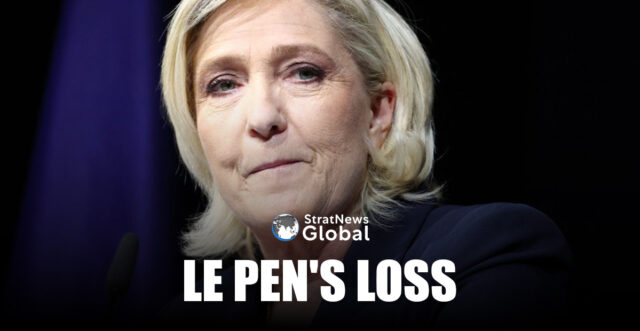
A week after pushing to topple former Prime Minister Michel Barnier’s government, France’s far-right National Rally (RN) suffered a surprise by-election loss late on Sunday.
The close vote in the Ardennes left Marine Le Pen’s RN with 124 lawmakers – a setback, though it remains the largest party in the 577-seat parliament.
The no confidence motion which toppled Barnier’s government, appointed barely three months ago by President Emmanuel Macron, came after Barnier used his executive powers to pass his budget for 2025 into law without a parliamentary vote.
In response to the move, the New Popular Front (a grouping of left and far left parties) and Le Pen’s National Rally, who together represent a majority of the 577 MPs in the assembly, moved a no-confidence motion to oust the minority government.
President Emmanuel Macron pressed on with meetings with leftist leaders on Monday as he seeks to name a new prime minister.
One of them, Green party leader Marine Tondelier, said the RN had “put themselves out of the game” and that the party’s influence over national politics was waning as a result of its decision to topple Barnier.
In the by-election, Lionel Vuibert – running as an independent but with close ties to Macron’s centrist coalition – won 50.9% in a run-off in the first voting district, where the far-right has had strong support. Vuibert had campaigned against the no-confidence motion.
The RN’s Jordan Duflot, who got the most votes in the first round and called for the toppling of the government during campaigning in the second round, won 49.1%. Turnout was low, at around 30%.
Vuibert’s “victory … is a strong signal” against “those who want censorship, inaction and chaos,” Xavier Bertrand, a centre-right politician who has been mooted by the press as a possible prime minister, wrote on X.
The by-election was called after the RN incumbent resigned for unspecified health reasons.
In a sign of the importance of the vote, RN party president Jordan Bardella travelled to the district to drum up support for Duflot, but it was not enough.
Le Pen’s move to bring down the government with the far left was a risky one, as it threatened to alienate the moderate conservatives she needs to win over for her expected fourth run for the presidency in 2027.
Macron has signalled that he wants to name a government chief quickly, although under the French Constitution, the National Assembly cannot be dissolved until July 2025, and Barnier will stay on as caretaker PM until Macron appoints a new prime minister based on a new coalition.
However, Tondelier appeared to pour cold water on the idea of a rapid hire, saying Macron had “understood that he must stop doing things his own way and rushing into appointments that would lead to no-confidence motions.”
Boris Vallaud, the leader of the parliamentary bloc of the Socialist Party, said on Monday his party would not join the government unless Macron names a leftist.
“If it is not a left-wing Prime Minister, we will not participate,” he said on France Inter.
The Socialists, a moderate leftist grouping with 66 seats in the National Assembly, also voted along with Le Pen’s RN to topple Barnier on Wednesday last week, but could emerge as crucial kingmakers.
If Macron can win their backing, a new prime minister would likely have the numbers to stave off no-confidence motions from other parts of the left and Le Pen’s RN.
(With inputs From Reuters)
In a career spanning three decades and counting, Ramananda (Ram to his friends) has been the foreign editor of The Telegraph, Outlook Magazine and the New Indian Express. He helped set up rediff.com’s editorial operations in San Jose and New York, helmed sify.com, and was the founder editor of India.com.
His work has featured in national and international publications like the Al Jazeera Centre for Studies, Global Times and Ashahi Shimbun. But his one constant over all these years, he says, has been the attempt to understand rising India’s place in the world.
He can rustle up a mean salad, his oil-less pepper chicken is to die for, and all it takes is some beer and rhythm and blues to rock his soul.
Talk to him about foreign and strategic affairs, media, South Asia, China, and of course India.




